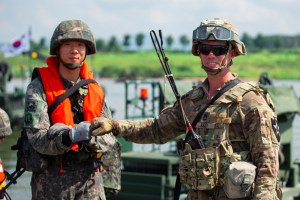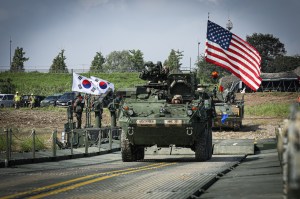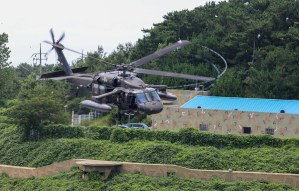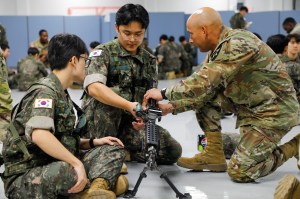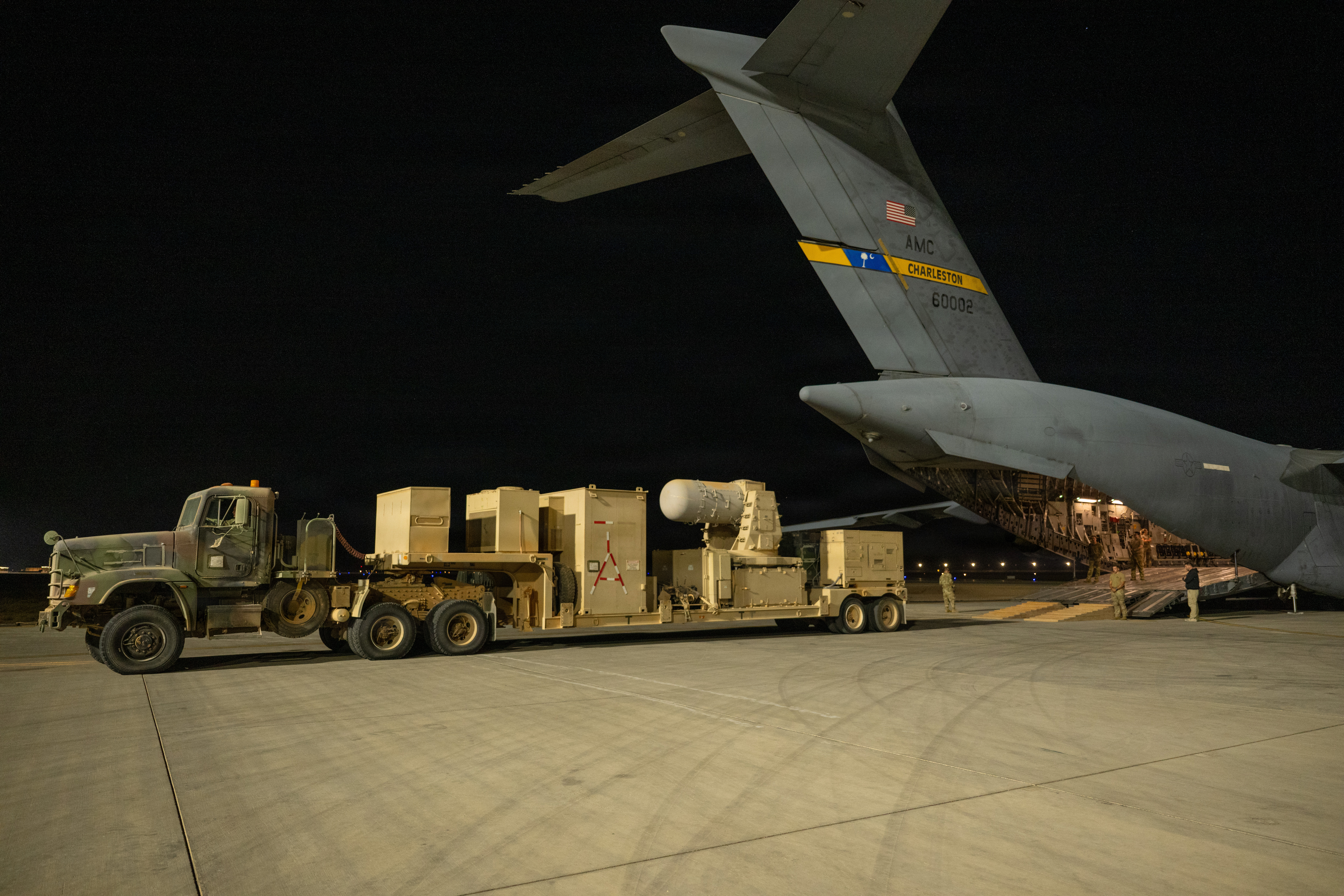Benjamin Backsmeier (U.S. Army) and George Lynch-Staunton (British Army)
September 25, 2025
The following are hard-earned lessons we hope will serve as guideposts for junior officers rapidly deployed into a joint, combined environment, wherever that may be. These aren’t just relevant for Korea; they apply anywhere across the spectrum of modern conflict.

As global security dynamics evolve and near-peer competition shapes military readiness, the Korean Peninsula remains a distinctive and long-standing area of strategic focus. Although the Korean War ended more than 70 years ago with an armistice—not a peace treaty—it has evolved into a unique strategic environment unlike any other in the world. Here, three commands operate in tandem: the Combined Forces Command (CFC), the United States Forces Korea (USFK), and the United Nations Command (UNC), each with distinct yet interdependent roles.
The UNC, under the banner of “Under One Flag,” represents a coalition of 18 partner nations committed to preserving peace and deterring aggression. This legacy of multilateral cooperation, forged during the Korean War, remains alive today through continual training and integration. The United Nations Command mission remains the same today as when it was established in 1950: to uphold its enduring commitment to securing peace on the Korean Peninsula by enforcing the Armistice Agreement, facilitating diplomacy with North Korea, and serving as the integrator for multinational forces during times of crisis or conflict. Exercise Freedom Shield, an annual training event, highlights this role by incorporating the UNC into multi-domain operations, testing responses across the full spectrum of conflict, and strengthening combined readiness and interoperability.
During Freedom Shield 25, we had the privilege of leading Noncombatant Evacuation Operations (NEO) for the UNC—one of us a permanent party British Army officer, the other a U.S. Army Reserve exercise replacement, or, as they deliberately refer to us in UNC, a reinforcement. We served alongside servicemembers from 11 other countries – Australia, Canada, Colombia, Germany, Italy, and New Zealand, to name a few. Together, we stepped into a combined, multinational effort and confronted the inherent complexities of leading in uncertain times.
Junior officers play a crucial role in the relationships between allies and partners. This demands commitment to learning, expertise, and trust. Their actions at the tactical level often serve as the first impression and are essential to enduring partnerships.
- Relationships Matter—Start Building Them on Day One
You can have the best plan, the most detailed CONOP, and every logistics requirement accounted for—but without relationships, none of it works.
In a multinational environment like UNC, your operational success depends on your ability to connect with a diverse group of stakeholders across services, nations, and time zones. Some wear different uniforms, speak in different doctrinal terms, or answer to different chains of command, but all want the same outcome: mission success. Getting there starts with a handshake, a coffee chat, a sincere question.
As reservists and active-duty officers dropped into planning teams, we quickly learned that rank alone doesn’t open doors—relationships do. Invest early and genuinely in those around you. It’s not about networking for the sake of it, but about creating mutual understanding and respect through shared values.
When building relationships, recognize that it’s built by both parties; you should actively listen to learn from your international peers more than you speak. Whenever possible, take the time to break bread by sharing a meal, go for a coffee or tea run, or immerse yourself in their cultural customs.
- Words Have Meaning—Learn the Differences Quickly
Even among English-speaking partner nations, military language isn’t universal. The writing of this paper even required us to compromise on the differences between American and British English grammar rules.
If you don’t know the meaning behind a term or acronym a partner uses, ask. Seeking clarity from our partners and allies isn’t just important from a practical perspective; it demonstrates humility and that you are invested in and care about the mission, inspiring confidence in your competence and commitment. Clarity up front saves frustration and rework down the road. The fight tonight is too fast-moving for assumptions.
The British use “Stage 1” as a step in implementing a NEO, whereas Americans use “Stage 1” to describe the geographic limitations of a unit’s NEO responsibilities. “Brigade” doesn’t mean the same structure in all nations. The term “combined” from the perspective of the United Nations Command can differ from both the standard US and NATO definitions, resulting in the same word being read differently in military plans. Doctrinal terms vary not just across services, but across cultures. New Zealand naval terms may differ from those used in Canadian Army doctrine. This can lead to misalignment in planning timelines, command authorities, or operational intent.
One of our earliest wins came not from solving a logistics shortfall, but from identifying a misunderstanding over the term “tactical control” (TACON). What seemed like a minor detail was actually a critical misalignment in planning assumptions between two partner forces.
- Build Trust Quickly—Credibility Earns Access
As an exercise that inherently involves replacement forces, we knew we wouldn’t have months to “settle in.” The time to earn trust was now or never.
Credibility in a high-functioning multinational command is earned through action, not resume. Showing up prepared, asking thoughtful questions, and following through on tasks quickly established one’s value to the team. People will give you room to operate if they know they can count on you.
This is especially important when dealing with sensitive or high-stakes missions, such as Noncombatant Evacuation Operations (NEO), where coordination with embassy personnel, host nation forces, and multiple commands must run like clockwork. Leaders must create psychological safety within their teams and among partners, showing that they’re reliable, adaptable, and mission-focused. Don’t wait on the sidelines for someone to direct your actions; roll up your sleeves and ask how you can chip in. Even better, proactively offer what you can do to support the task, mission, and team.
- All Decisions Are Local—Know the IO Fight
The Republic of Korea is a highly connected environment, where every action, even those intended for internal coordination, can have external perception implications.
That means every decision, no matter how tactical, has strategic weight. A poorly timed convoy, a misinterpreted social media post, or a misunderstood training objective can all spiral into an information operations (IO) challenge. The UNC relies on partner nations, with the support of their government and populace, to contribute and sustain forces to the fight. When our enemies can influence the IO fight domestically, it can put the resources and contributions being utilized in the fight at risk.
For the NEO mission, we had to consider not only the safe transportation of people but also how the host nation, the global public, and the media would perceive the mission. Our partners range across the entire government continuum, from stakeholders in the U.S. Embassy and the ROK Ministry of Foreign Affairs to UNC’s public affairs team, where they became just as important as our logistics planners and security liaisons.
In an era of rapid narrative shaping and weaponized disinformation, the information domain is at the heart of every plan. Junior officers’ understanding is critical to shaping operations that anticipate and counter adversary influence campaigns. When working with partner nations, ask for their thoughts and opinions. No one knows the potential setbacks to how messaging will influence better than those who are from that nation.
- National Caveats Are Real—Account for Them Early & Respect Them
Perhaps one of the most eye-opening aspects of working within UNC was navigating national caveats—the specific limitations individual nations place on their military contributions.
These aren’t just bureaucratic hurdles. They’re hard red lines based on national policy, legal constraints, and political oversight. In a real-world operation, ignoring or misunderstanding a national caveat could mean unintentionally tasking a force with something they are legally prohibited from doing, or creating political unrest resulting in their departure from the battle space.
In Freedom Shield 25, we worked closely with our counterparts to understand each nation’s operating limits. Some caveats included restrictions on the nationality of evacuees that specific countries could carry; others had strict loading priorities or geographical boundaries, all of which were adhered to. Rather than being frustrated, we learned to plan within those caveats in mind—to build realistic, executable plans that respected each nation’s contribution.
Multinational operations require integrity. We don’t get to set the rules for our partners—but we do have a responsibility to understand, respect, and honor them.
A Mission Worth Doing
Freedom Shield 25 wasn’t just another training event. It was a real-world rehearsal for what could be the most complex evacuation mission ever needed. Leading NEO operations in this context gave us a front-row seat to the strength and complexity of the UNC and the RoK-US Alliance.
In multinational military operations, success doesn’t hinge on any one capability. It relies on relationships, trust, clear communication, cultural understanding, and a commitment to shared purpose. The Army will require leaders at all echelons to understand the larger scope of their operations.
Whether you’re heading to Korea, Europe, or anywhere else conflict simmers, remember: your ability to lead in ambiguity starts long before the first brief or first convoy. It starts with how you show up, how you listen, and how you build the team around you.
“Under One Flag” isn’t just a motto. It’s a mission and a mindset that you can begin working on now.
Authors:
Major Ben Backsmeier is an Infantry Officer currently serving as the NEO Planner for the INDO-PACOM Army Reserve Element (ARE). He previously served on active duty at US Army Japan and in the 82nd Airborne Division. He has previously deployed or served overseas in 11 countries. He holds a BS from West Point, a Masters from the University of St. Andrews in Scotland, and a MBA from the University of Chicago Booth School of Business.
Major George Lynch-Staunton is an Armoured Officer from the King’s Royal Hussars, an armoured regiment of the British Army. He is currently assigned to the United Nations Command NEO Cell. He has held a number of command and staff roles in the United Kingdom and has deployed on several operational tours.

